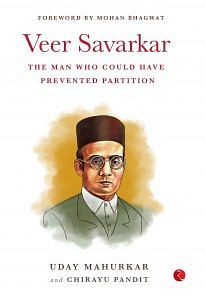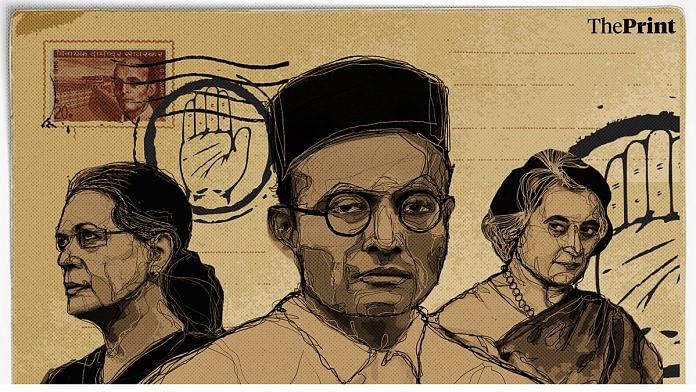If the Desai–Liaquat Pact, the INA’s surrender of Rangoon and the Wavell Plan were political setbacks for Savarkar, he faced a major setback on the personal front too when in March 1945, he lost his elder brother and guide, the great revolutionary Ganesh, alias Babarao, Savarkar. His brother had spent many years with Savarkar in the cellular jail in Andaman, and had had a profound impact on Dr K.B. Hedgewar and his decision to found the RSS to protect Hindu interests against unwarranted Muslim aggression. Savarkar’s youngest brother, revolutionary Dr Narayanrao Savarkar, was at Babarao’s deathbed when he died at Sangli. Savarkar used to send him `100 a month for his upkeep. The devotion of the trio to the nation is best exemplified by Babarao’s example at the time of his death. The last inquiry was about the communist threat to Nepal. Savarkar wrote moving letters to Babarao in his last years. One of them read:
“Our (of the trio) life work was one. In our generation, we have tried to repay our spiritual debt to our forefathers. No historian of modern Hindustan will fail to write in golden letters one separate chapter (on their contribution to the nation). Our political opponents have familiarized the title of that chapter as the Savarkar epoch. By giving to the countrymen two battle cries, ‘Victory to the Goddess of Liberty’ and ‘Hindustan belongs to the Hindus’ we have thus been instrumental twice in bringing about a fundamental revolution in the nation’s ideology and active political life. The Lord of Death who is now standing by your side is meeting you, not like a foe, but like a friend. In sufferings as in happiness never did you drop down the banner of revolution.”
After the failure of the Wavell Plan, the Congress party president Abul Kalam Azad presented Gandhi a plan for winning the support of the Muslim population to keep the nation united against the divisive Muslim League agenda. The plan said that when Muslims were convinced that Hindus were not using their numerical strength to bulldoze them, they would give up the idea of Pakistan. It also said that once India becomes independent, the economic, political and class interests will automatically prevail over religion-based considerations.
Also read: The real story is Gandhi, Savarkar were on same page on Hindi, Hindu, Hindustan — and caste
Azad’s suggestion list echoed in the Congress party resolution, passed only a few weeks later on 21 September 1945 at the party’s national meet at Bombay, which was nothing but a reiteration of the ‘self-determination’ resolution of 1942. The resolution while
talking about United India said:
“Nevertheless, the Committee also declares that it cannot think in terms of compelling the people in any territorial unit to remain in an Indian union against their declared and established will. While recognizing this principle, every effort should be made to create conditions which would help different units in developing a common and cooperative national life. Each territorial unit should have the fullest possible autonomy within the union consistently with a strong national State.”
This secession clause however invited strong opposition from sections of the Congress and therefore it was decided to approach the Muslim population directly instead of the Muslim League. In the meantime, there were changes in the political matrix in Britain. In the general election held in mid-1945, the Churchill-led Conservative Party lost and the Labour Party won a landslide victory. Clement Attlee now replaced Churchill as the British prime minister. Almost immediately after this, Japan surrendered in World War II.
Wavell went back to London in the second half of August to ascertain the views of the new administration on the Indian problem under the changed circumstances in which the British no longer faced war threat from Japan on India’s eastern frontier. On his return, in mid-September, he immediately announced general elections to test the strength of various political parties, first at the central level and then at the provincial level. The Attlee administration was much more sympathetic to the cause of Indian freedom then the previous Churchill regime.
Also read: When Gandhi murder investigator got on the same taxi Godse and others took
Choosing Between the Congress and Conscience
Interestingly, as soon as elections were announced, known jurist and intellectual, M.R. Jayakar, tried to explore a United Hindu front in the elections against the Muslim League threat by approaching the then Hindu Mahasabha president S.P. Mukherjee. In response, Mukherjee, in his reply of 16 October, turned down the proposal and wrote:
“I am most anxious there should be no division among the Hindus at this crisis. In fact, ever since I became President of the Hindu Mahasabha, I have been pleading for a united front among as many nationalists parties as possible that may be agreed on the fundamental issues connected with the freedom of United India. Many now feel that there is no difference between the Congress and the Hindu Mahasabha in view of the Poona resolution and the open declaration against the league and the Pakistan issue by eminent Congress leaders. But this is not exactly the real case. … The last few sentences (of the Poona resolution) are indeed ominous. The Congress there accepts self-determination of territorial units… Thus, we have before us three schemes for partitions of India: one of the Cripps type, the second of the League type and the third of the Congress type. The only body which will be uncompromising on the question of India’s integrity will be the Hindu Mahasabha; others will differ on the areas that may be partitioned and on the method of determining such areas. The present Congress stand will not appease the League, but it will certainly create extra ordinary complications on the main issues of division of India when the constitution-making body will start to function. I am told Sardar Patel and some others were opposed to any concession on the partition issue, but they had to yield in view of the threatened resignation of the President.”
Clearly, even after Savarkar’s departure as the president, the Mahasabha continued to oppose the Partition proposals with all its might. Savarkar suffering from fever and extreme weakness was almost bed-ridden on the eve of the elections. His teeth were removed; so he was unable deliver a speech. Still from his bed, he tried to wake up the Hindus when the crucial hour of the elections came. He issued clinical and impassioned statements, which implored the voters to save the country from ruin by their vote.
Savarkar went a step further. By declaring ‘Choose one: Congress or Conscience’, he appealed to Hindu followers of the Congress to join hands with Hindu Sagathanists to realize the national goal. It was reminiscent of Chhatrapati Shivaji’s appeal to Mughal commander Mirza Raja Jai Singh in 1665 to fight for the Hindu cause rather than fighting for the fanatic emperor, Aurangzeb. Reminding Congress workers of the sacrifices of the Hindu Sanghathanists for protecting Hindu temples and Hindu honour against Muslim aggression, Savarkar warned the Congressite Hindus:
“But remember if we few who are fighting for the Hindu cause are defeated, the blame of the defeat can never be attached to us who continued the good fight, but to those millions of Hindus who did not join the fight but kept on the fence and simply witnessed the Hindu banner sullied, the unity of India cut into pieces, the Hindusthan turned into Pakistan.”
As the Hindu Mahasabha headed into the elections, it had a fairly good all-India presence, as demonstrated by the response that Savarkar received throughout the country between 1938 and1943. Having established the Hindu Mahasabha as a political party in true sense, he had led the party in its defeat of Congress candidates in many important municipal, local and district board elections and by-elections to the legislatures.
Also read: Godse was ‘yearning’ for Savarkar’s support in Gandhi murder trial court. But it never came
Had the Congress followed Savarkar’s strategy, India could have saved Hindu-majority areas in the east and the west, including parts of Sindh—an area, when put together, is almost the size of today’s Bihar—approx. 90,000 sq. km. Importantly, no honest observer of India’s Independence struggle can deny that the Hindu Mahasabha’s Save India campaign, despite the party’s lack of electoral strength, had contributed significantly to saving whatever Hindu-majority parts of the east and the west India did manage to save.
The last disposition of the then party president Acharya Kripalani in the nine-hour meeting was full of narration of horrendous incidents during his visits to the riot-affected areas in Punjab, which shook one and all. In one village, he said, he had seen a well into which women with their children, numbering 107, had thrown themselves to save themselves from dishonour. In another place, 50 women were killed by their menfolk to keep their honour intact. Then, he narrated his visit to a place where he saw heaps of bones of 307 persons who had been driven, locked up and burnt alive.
He admitted that it was the fear of violence that made the Congress accept Partition. But he added in the same vein that more than the lives lost and of wails of the widows and cries of the orphans, the decision was forced by the spectre of the continuing indignities heaped by people upon each other as a result of violence and retaliation that was reducing ‘ourselves to cannibalism’.
As the Congress accepted the Partition scheme, even Congress-minded newspapers, such as the Free Press Journal criticized the party with the headline ‘Nation’s leaders betray country’s cause’.
Also read: Pew India survey takes us back to one more thing Gandhi, Savarkar differed on
This brings us to the moot question: who actually caused Partition? After examining the story of Partition from all the angles, no honest historian can deny that Partition was essentially caused due to the beliefs of Gandhi and Rajaji. Nehru maybe accused of not seeing the Partition threat as serious and only as a bargaining chip by Jinnah to get more concessions for Muslims. Patel may be blamed for remaining silent, perhaps under Gandhi’s aura, during the crucial period between 1940 and 1942 when Gandhi, and, even the Congress, gave in to the Pakistan demand in the name of self-determination.
Also, the Congress being a leader-led party then, as it is now, once Nehru, Gandhi and Patel had accepted Partition as fait accompli, there was no one to oppose it in the party. Savarkar had repeatedly pointed out this weakness and asked the people to remember that the Congress party and its leaders were not greater than the nation. Dr Ambedkar also held the same view about the Congress and aired it in no uncertainly terms in the Constituent Assembly itself.
 This excerpt from ‘Veer Savarkar’ by Uday Mahukar and Chirayu Pandit has been published with permission from Rupa Publications.
This excerpt from ‘Veer Savarkar’ by Uday Mahukar and Chirayu Pandit has been published with permission from Rupa Publications.



